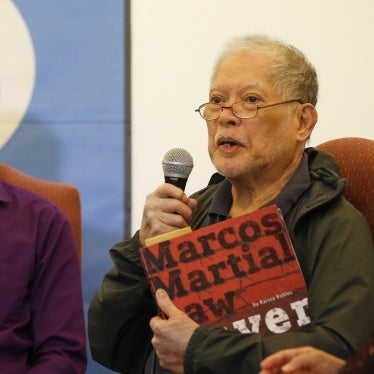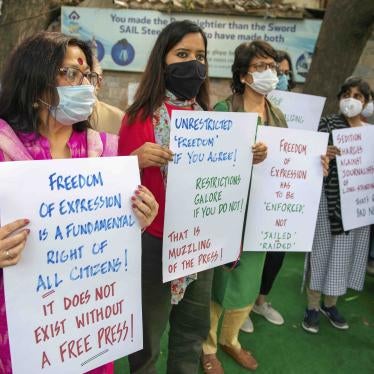After a long wait for political parties to get their act together, there have been some important developments in the faltering peace process since the formation of the coalition government led by Prime Minister Baburam Bhattarai in August this year. These include steps forward in recent weeks on the integration and rehabilitation of former Maoist combatants and the formation of a high level committee to resolve outstanding disputes on the drafting of a new constitution. Nepalis can renew their hope that maybe this time Nepal will be able to take significant steps towards creating a peaceful democracy under the rule of law.
But, in spite of this flurry of activity, the decision of the government to refuse an extension of the presence of the UN’s highest human rights body, the Office of the High Commissioner for Human Rights (OHCHR), calls the government’s commitment to human rights into grave doubt. Having stripped OHCHR’s mandate of the ability down to its core, the government now wants OHCHR completely out of the country.
What does this signify for people like Purnimaya Lama, whose husband was killed by the Maoists during the civil war, or Abdul Majid Dewan, who saw his son shot by security forces? Both were in Kathmandu a few weeks ago campaigning for justice, even as the front-pages celebrated the integration of combatants and the extension of the assembly. Yet, their voices remain largely unheard. Thousands of victims of the civil war, who dared to hope for justice following the Comprehensive Peace Agreement (CPA) in 2006, are still waiting for answers. What happened to their loved ones who disappeared? Why were they tortured? Who will be held responsible? Five years on, they are still waiting for justice; with each passing year, they lose hope. But they have not lost, nor will they, the desire to find the truth.
For the past four years Human Rights Watch and Advocacy Forum have been following 62 cases of victims and families who have turned to the Nepali justice system for answers and redress. Lawyers with Advocacy Forum have assisted the families in their pursuit of justice—filing First Information Reports, drafting writ petitions, filing appeals. Each year we have updated the progress on these cases. What these updates reveal is simply shocking: to date, not a single war-time case has been tried in civilian courts. Our latest report, Adding Insult to Injury, released on November 30, 2011, confirms the sameness of it all.
The justice system is routinely failing victims. Police and security forces simply ignore court orders. More disturbing in a nascent democracy is that the courts themselves are unable to do anything to enforce their orders.
While Nepali political parties pay lip service to justice and accountability, these facts are rapidly becoming a mere footnote. They treat people like Purnimaya Lama and Abdul Majid Dewan as mere annoyances that they hope will go away. When confronted, authorities mutter that such issues lie with agencies other than the police and courts, that they lie namely with the non-existent Truth and Reconciliation and Disappearances Commissions.
When Bhattarai took office, he promised that these commissions, now five years delayed, would be established within a month. That month has already turned into three. OHCHR’s brief in Nepal was, among other things, to monitor the implementation of the human rights components of the peace agreement, including the establishment of the transitional justice mechanisms. Rather than seek the expert assistance of OHCHR at a particularly critical point in the peace process, Bhattarai appears to have chosen to kick OHCHR out of the country. This will be a great comfort to past and present human rights abusers.
Why they want to do this is clear. The reality is that finding answers and delivering justice to victims sits uncomfortably with political parties who do not wish to be held accountable. The Maoists don’t want to see their cadre held responsible for their brutalities during the conflict. They seem to think that their new-found legitimacy as a legal political party allows them to gloss over terrible crimes committed in the name of their ideology: the killings and torture of ordinary teachers, journalists, civil servants and farmers were justified because they were class enemies or traitors to their cause.
The opposition parties now crying foul at Bhattarai’s refusal to extend OHCHR’s presence have only to remember that they themselves initiated the process of marginalising OHCHR. They have actively protected the army and their own party members from accountability. Many of the crimes committed by government forces happened under their watch. Human rights groups, both local and international, have long held up the case of Maina Sunuwar as emblematic, who a military tribunal ruled was killed as a result of torture while in army custody. The fact that this case, which the army itself concedes was a crime, cannot be tried in civilian courts and the army actively protects named perpetrators for this heinous act shows just how deeply entrenched the culture of impunity has become.
Perhaps most worrying at present is the recent talk among Maoist leaders and others about issuing pardons and amnesties for serious human rights abuses. This may turn out to be a subject on which the Maoists and the army can agree. But it would be a fatal blow for the establishment of the rule of law in the new Nepal. Without critical input from OHCHR and civil society on these drafts, Nepal would already have had a watered down Truth and Reconciliation Commission, which would have conditioned compensation for victims on agreement to pardon the perpetrator. In such a poor country, the power of money, they hope, speaks louder than the power of justice.
The end of the civil war in Nepal was a watershed moment in the country’s history. The country was officially transformed, overnight, from an autocratic monarchy into a democratic republic. The lack of justice was a driving factor in both the largely rural Maoist movement and the largely urban Jana Andolan that brought down the monarchy in 2006. The peace agreement set forth lofty promises, and invited an international body to ensure those promises were kept. Citizens, scarred and cowed by a decade of civil war, began to allow themselves to believe that this new country would be different. Among those most hopeful were the victims and witnesses of the conflict who were assured that they would find the answers they wanted. If OHCHR is forced to pack up its boxes, these hopes will be greatly diminished.
Tejshree Thapa is a South Asia researcher at Human Rights Watch.






